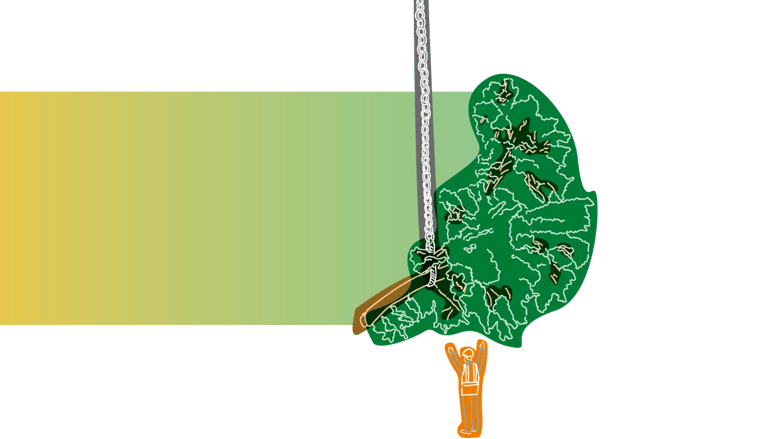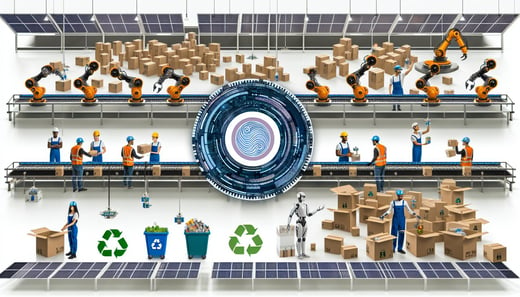
Green manufacturing - embracing sustainability challenges as a catalyst for long-term growth
January 2024
by the 42T Manufacturing & Automation Team
In today’s manufacturing landscape, sustainability is not a choice but an imperative. Organisations are under increasing pressure to meet ambitious sustainability targets in manufacturing and packaging, which presents many challenges and complexities. Yet, it’s in these challenges that opportunities for innovation and progress lie. Because 80% of a product’s circularity may be determined at the design stage, the call for transformative strategies from the outset is essential.
At 42T, our experience with clients across various sectors has highlighted a critical insight: sustainability challenges, when approached with innovation and foresight can be powerful catalysts for progress in the circular economy. The urgency for manufacturing businesses to perceive sustainability as an opportunity cannot be overstated.
In a world increasingly conscious of environmental impact, sustainability is a defining factor in a company’s market presence and reputation. Businesses that fail to adapt to this new reality, neglecting to infuse sustainability into their core operations, risk not just falling behind but becoming irrelevant in a market that favours environmentally conscious brands. This article delves into these challenges and opportunities, exploring how and why companies need to reframe sustainability as a key driver of competitive advantage.

The journey to sustainable packaging is beset with interconnected complexities in terms of design, regulations, materials and supply chains, energy, and financial implications. For example, regulations like the Packaging and Packaging Waste Regulation (PPWR) may demand a comprehensive redesign of traditional packaging. The choice between recyclable and compostable materials, for instance, is influenced by factors ranging from waste management infrastructure to life cycle analyses. Furthermore, sustainable packaging materials like bioplastics might not be as established or reliable as for traditional materials like blister packaging. This can lead to variability in material quality, availability issues, and fluctuations in pricing, all of which can disrupt production schedules and budgeting.
The shift to greener energy sources in manufacturing is another critical challenge, balancing ecological responsibility with financial viability. Innovations such as heat pumps and waste heat recovery are key in mitigating the financial impacts of electrification. However, transitioning from traditional energy sources like natural gas to alternatives such as hydrogen involves intricate considerations of energy density, infrastructure changes, and by-product management. Beyond these considerations, it is also crucial for manufacturers to rigorously test new technologies and materials to ensure compatibility with existing production lines and systems.

Our work with Fox’s Burton’s exemplifies this proactive approach. In our fuel-switching project, we assisted Fox’s Burton’s in transitioning to more sustainable energy sources, while enhancing operational efficiency. This project represents more than just an environmental win; it’s a strategic move that positions Fox’ Burton’s as a forward-thinking player in their industry.
“Many global retailers and consumers are requesting net-zero supply. A successful transition to high-efficiency and low-emission industrial baking technology would allow that demand to be met and maintain competitiveness, local revenue, jobs and skills.”
Martin Beckford, Group Energy Reduction Project Manager, Fox’s Burton’s Companies
To navigate these sustainability challenges, a multifaceted and innovative approach is required. Viewing compliance as an opportunity for business enhancement rather than a hurdle is vital. Often, the most effective solutions emerge from outside the standard, comfortable process of incremental innovation, and so benefit from an external expert perspective to overcome embedded limitations. The work 42T has been doing with our clients – ranging from aiding significant water usage reductions in food processing to helping industrial processes transition to more sustainable fuels – illustrates this.
Identifying sustainable materials for food packaging that balance user experience, cost, and manufacturing requirements, to redesigning beverage packaging to incorporate mono-material solutions, are just some of the ways that we’ve helped businesses turn sustainability challenges into opportunities.
Another promising trend is the formation of consortiums among manufacturers, particularly in sectors with standardised packaging formats. These collaborations foster shared solutions for challenges like finding recyclable options for traditionally non-recyclable packaging. Through collective knowledge and resource sharing, industry-wide standardised solutions can be developed, benefiting all stakeholders. With this collaborative, big-picture approach, businesses can shift towards long-term planning and vision in sustainability instead of getting caught up in immediate regulatory compliance and short-term market gains.
Moreover, while measuring and reporting on sustainability progress is currently a challenge for many manufacturing businesses – research by Harvard Business Review found that 79% of food companies have struggled to measure environmental performance across the supply chain – the opportunity to improve traceability and transparency in manufacturing is a promising one. With standardised procedures for reporting on environmental impact, businesses can boost operational efficiency and gain valuable data insights that can be used to save money in the long run.
From 42T’s vantage point, significant investment and proactive strategies are key to manufacturers unlocking savings and excelling in a market driven by consumer and regulatory demands. The challenge isn’t solely about meeting sustainability targets, but doing so in a way that drives business performance and advances long-term innovation. Collaboration is key; businesses that rely solely on suppliers for sustainability solutions risk losing market share. This is because achieving compliance in a manner that adds value to the business often requires fresh perspectives which external experts and partnerships are often best placed to provide.
Was this trend article useful? Have a challenge of your own?
Email answers@42technology.com or give us a call on +44 (0)1480 302700.
Share this article:
Related Articles

Manufacturing & Automation, Industrial
How to bring sensing in manufacturing out of the lab and onto the line

Manufacturing & Automation
Digitalisation in manufacturing - building on the foundations of good data

Manufacturing & Automation
Food & beverage industry - trends to be aware of in 2024

What will you ask us today?
We believe in asking the right questions to drive innovation; when we know the right questions, we generate the ideas to answer them.





